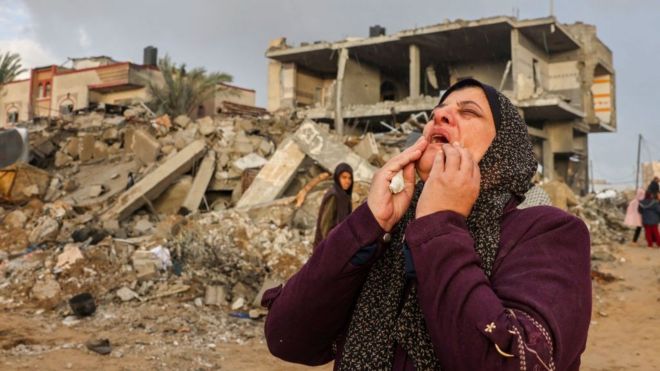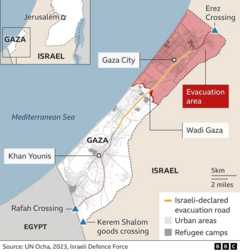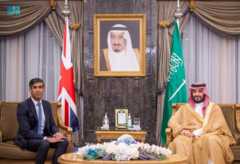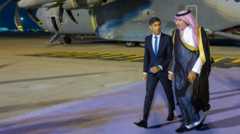Saleh al-Arouri Senior Hamas official killed in Israel Drone Strike Musharafieh Beirut, Lebanon
SalehAl-ArouriSeniorHamasOfficialKilledInIsraelDroneStrikeMusharafiehBeirutLebanon
-
Handy Easy Email and World News Links WebMail
GoogleSearch INLTV.co.uk YahooMail HotMail GMail -
AOLMail Twitter euronews.com/live aljazeera.com/live
USAMAIL W
ikiLeaks wikipedia.org Facebook INL News MyWayEmail INLNews AWN. bz rte.ie/player/NEWS - news.sky.com/watch-live New York Post nypost.com YouTube
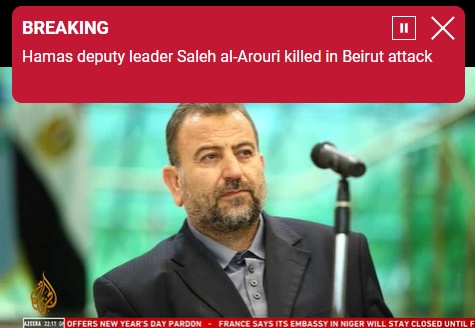
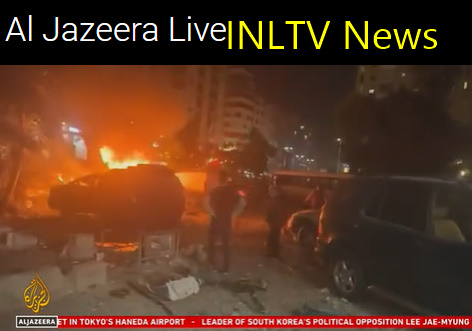
Saleh al-Arouri Senior Hamas official killed in Israel Drone Strike Musharafieh Beirut, Lebanon
The audacious attack hit Hamas’s office in Musharafieh, a southern suburb of Beirut. Senior Hamas official
Saleh al-Arouri was Saleh al-Arouri Senior Hamas official killed in Israel Drone Strike Musharafieh Beirut, Lebanon
Click Here for the best range of Amazon Computers
Click Here for INL News Amazon Best Seller Books
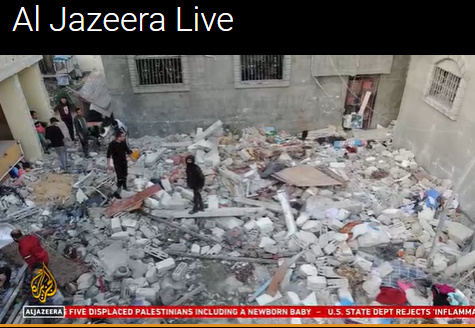
images/Saleh al-Arouri Senior Hamas official killed in Israel Drone Strike Musharafieh Beirut, Lebanon
Saleh al-Arouri Senior Hamas official killed in Israel Drone Strike Musharafieh Beirut, Lebanon Part2

Saleh al-Arouri Senior Hamas official killed in Israel Drone Strike Musharafieh Beirut, Lebanon
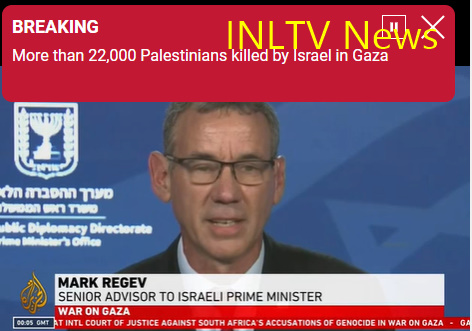
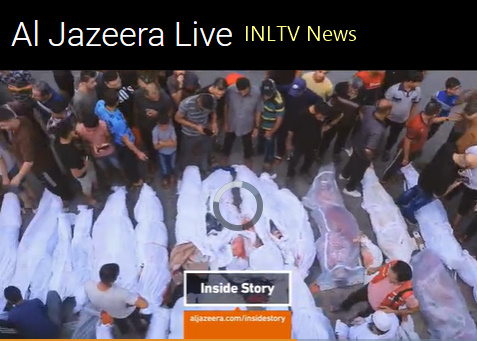
Saleh al-Arouri Senior Hamas official killed in Israel Drone Strike Musharafieh Beirut, Lebanon
Saleh al-Arouri Senior Hamas official killed in Israel strike in Musharafieh, Beirut
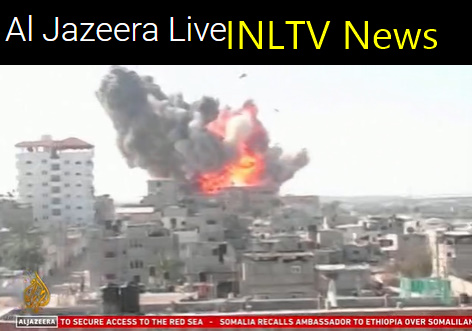
Saleh al-Arouri Senior Hamas official killed in Israel Drone Strike Musharafieh Beirut, Lebanon
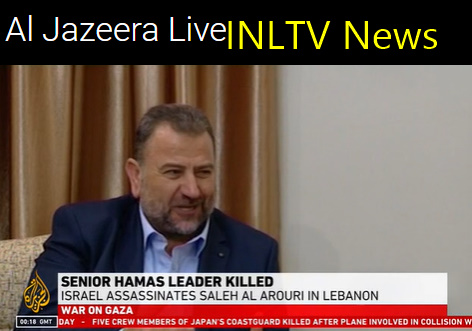
Saleh al-Arouri Senior Hamas official killed in Israel Drone Strike Musharafieh Beirut, Lebanon
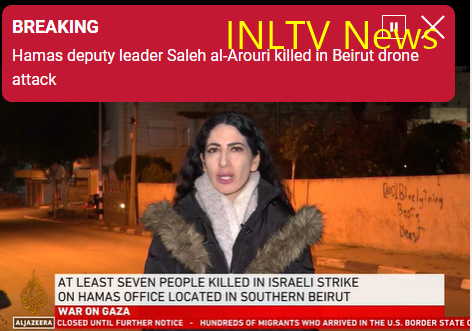
Saleh al-Arouri Senior Hamas official killed in Israel Drone Strike Musharafieh Beirut, Lebanon
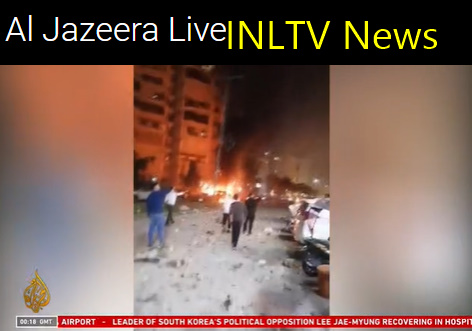
Saleh al-Arouri Senior Hamas official killed in Israel Drone Strike Musharafieh Beirut, Lebanon
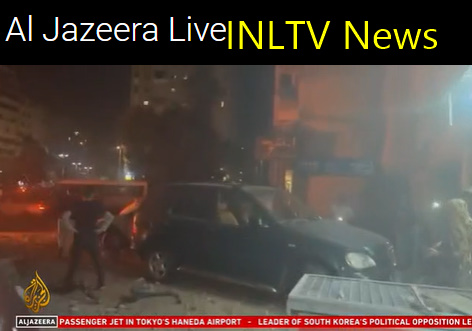
Saleh al-Arouri Senior Hamas official killed in Israel Drone Strike Musharafieh Beirut, Lebanon

Saleh al-Arouri Senior Hamas official killed in Israel Drone Strike Musharafieh Beirut, Lebanon
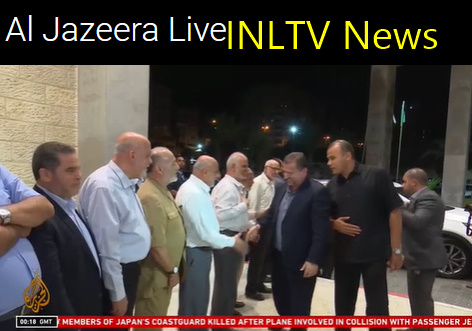
Saleh al-Arouri Senior Hamas official killed in Israel Drone Strike Musharafieh Beirut, Lebanon

Saleh al-Arouri Senior Hamas official killed in Israel Drone Strike Musharafieh Beirut, Lebanon

images/Saleh al-Arouri Senior Hamas official killed in Israel Drone Strike Musharafieh Beirut, Lebanon
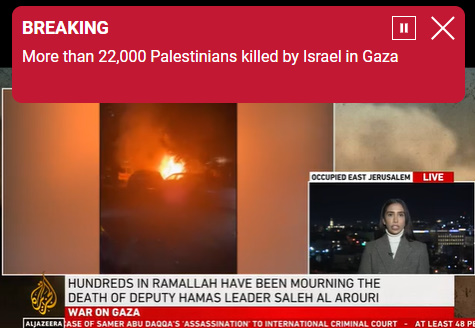
Saleh al-Arouri Senior Hamas official killed in Israel Drone Strike Musharafieh Beirut, Lebanon
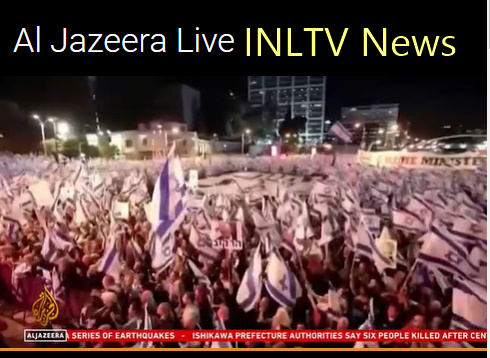
Saleh al-Arouri Senior Hamas official killed in Israel Drone Strike Musharafieh Beirut, Lebanon
Saleh al-Arouri Senior Hamas official killed in Israel Drone Strike Musharafieh Beirut, Lebanon
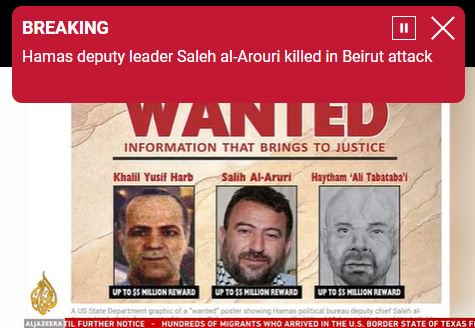
images/Saleh al-Arouri Senior Hamas official killed in Israel Drone Strike Musharafieh Beirut, Lebanon
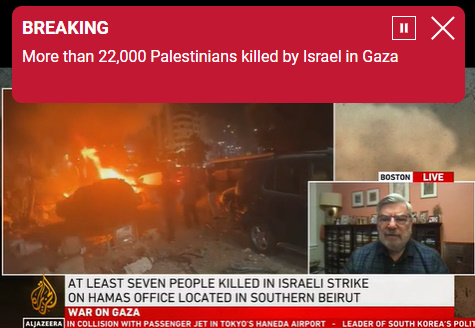
images/Saleh al-Arouri Senior Hamas official killed in Israel Drone Strike Musharafieh Beirut, Lebanon Ph6.jpg
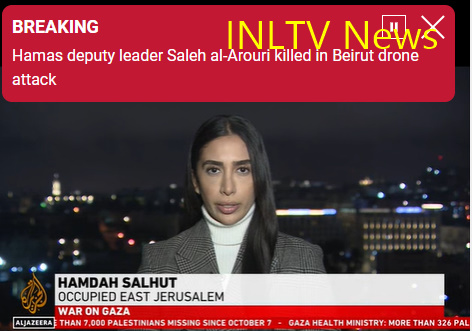
Saleh al-Arouri Senior Hamas official killed in Israel Drone Strike Musharafieh Beirut, Lebanon
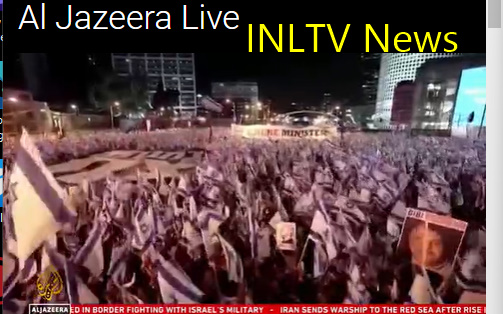

Saleh al-Arouri Senior Hamas official killed in Israel Drone Strike Musharafieh Beirut, Lebanon

Saleh al-Arouri Senior Hamas official killed in Israel Drone Strike Musharafieh Beirut, Lebanon

Saleh al-Arouri Senior Hamas Leader
Saleh al-Arouri Senior Hamas official killed in Israel Drone Strike Musharafieh Beirut, Lebanon

Saleh al-Arouri Senior Hamas official killed in Israel Drone Strike Musharafieh Beirut, Lebanon

Hamas deputy leader killed in explosion south of Beirut

Saleh al-Arouri Senior Hamas official killed in Israel Drone Strike Musharafieh Beirut, Lebanon
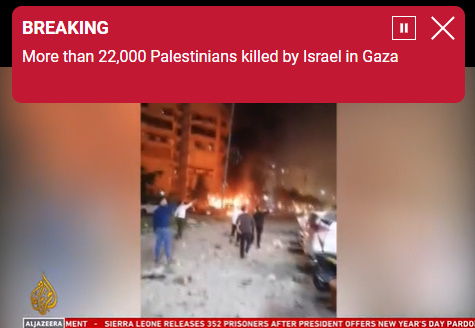
More than 20,000 Palestinians Killed in Gaza
Saleh al-Arouri Senior Hamas official killed in Israel Drone Strike Musharafieh Beirut, Lebanon
Saleh Arouri was one of four killed in an Israeli drone strike in the Lebanese capital, Hamas says
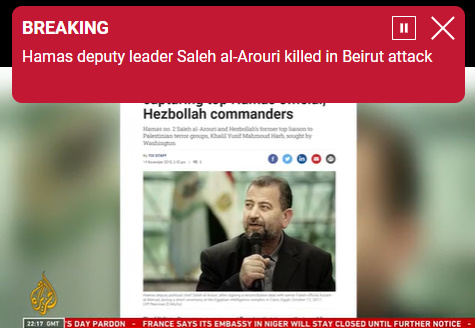
images/Saleh al-Arouri Senior Hamas official killed in Israel Drone Strike Musharafieh Beirut, Lebanon
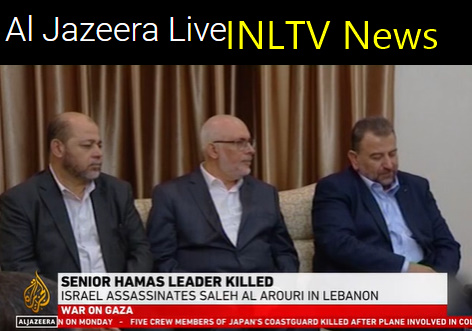
Senior Hamas Leaser Killed
Israel Assassinates Saleh al-Arouri Senior Hamas official In Lebanon
Saleh al-Arouri Senior Hamas official killed in Israel Drone Strike Musharafieh Beirut, Lebanon
Saleh al-Arouri Senior Hamas official killed in Israel Drone Strike Musharafieh Beirut, Lebanon
An explosion in Beirut on Tuesday killed Saleh Arouri, a top official with the Palestinian militant group Hamas and three others, officials with Hamas and the Lebanese group Hezbollah have confirmed.
Arouri, one of the founders of Hamas’s military wing, had headed the group’s presence in the West Bank. Israel’s Prime Minister Benjamin Netanyahu had threatened to kill him even before the Hamas-Israel war began on October 7.
Hezbollah leader Sayyed Hassan Nasrallah has vowed to retaliate against any Israeli targeting of Palestinian officials in Lebanon.
Hamas official Bassem Naim confirmed to The Associated Press that Arouri was killed in the blast. A Hezbollah official speaking on condition of anonymity in line with regulations also said Arouri was killed.
Israeli officials declined to comment.
Lebanon’s state-run National News Agency said the blast killed four people and was carried out by an Israeli drone.
The explosion shook Musharafieh, one of the Lebanese capital’s southern suburbs, which are a stronghold of the militant Hezbollah group, an ally of Hamas.
It caused a fire in Hadi Nasrallah Street south of Beirut.
Videos circulating on social media showed serious damage and fire.
The explosion came after more than two months of heavy exchanges of fire between Israeli troops and members of Hezbollah along Lebanon’s southern border.
Since the fighting began it has been concentrated a few miles from the border but on several occasions Israel’s air force hit Hezbollah targets deeper in Lebanon.
Earlier in the day, Hezbollah said its fighters carried out several attacks along the Lebanon-Israel border targeting Israeli military posts.
– Associated Press
Hamas deputy leader killed in explosion south of Beirut | Business Post
An explosion in Beirut on Tuesday killed Saleh Arouri, a top official with the Palestinian militant group Hamas and three others, officials with Hamas and the Lebanese group Hezbollah have confirmed.
Arouri, one of the founders of Hamas’s military wing, had headed the group’s presence in the West Bank. Israel’s Prime Minister Benjamin Netanyahu had threatened to kill him even before the Hamas-Israel war began on October 7.
Hezbollah leader Sayyed Hassan Nasrallah has vowed to retaliate against any Israeli targeting of Palestinian officials in Lebanon.
Hamas official Bassem Naim confirmed to The Associated Press that Arouri was killed in the blast. A Hezbollah official speaking on condition of anonymity in line with regulations also said Arouri was killed.
Saleh al-Arouri Senior Hamas official killed in Israel Drone Strike Musharafieh Beirut, Lebanon

Senior Hamas official killed in Israeli drone strike in Beirut, Lebanon – NBC New York
Israel had accused Arouri, 57, of masterminding attacks against it in the West Bank, where he was the group’s top commander
By Associated Press
National Security Council spokesman John Kirby said Thursday that the U.S. was urging Israel to pivot from high- to low-intensity tactical strategies amid growing scrutiny about the humanitarian crisis in Gaza.
An apparent Israeli strike in the Lebanese capital of Beirut killed Hamas' No. 2 political leader Tuesday, marking a potentially significant escalation of Israel's war against the militant group and heightening the risk of a wider Middle East conflict.
Saleh Arouri, who was the most senior Hamas figure killed since the war with Israel began, was also a founder of the group's military wing. His death could provoke major retaliation by Lebanon’s powerful Hezbollah militia.
The strike hit an apartment in a building in a Shiite district of Beirut that is a Hezbollah stronghold, and Hezbollah leader Sayyed Hassan Nasrallah has vowed to strike back against any Israeli targeting of Palestinian officials in Lebanon.
Hezbollah and the Israeli military have been exchanging fire almost daily over the Israeli-Lebanese border since Israel’s military campaign in Gaza began nearly three months ago. But so far the Lebanese group has appeared reluctant to dramatically escalate the fighting. A significant response now could send the conflict spiraling into all-out war on Israel’s northern border.
Lebanon’s state-run National News Agency said the strike was carried out by an Israeli drone, and Israeli officials declined to comment. Speaking to reporters, Israeli military spokesman Rear Adm. Daniel Hagari did not directly mention Arouri's death but said, “We are focused and remain focused on fighting against Hamas.”
“We are on high readiness for any scenario,” he added.
The killing comes ahead of a visit to the region by U.S. Secretary of State Antony Blinken, even as the United States has tried to prevent a spread of the conflict, repeatedly warning Hezbollah — and its regional supporter, Iran — not to escalate the violence.
Israeli Prime Minister Benjamin Netanyahu has vowed to press ahead with the assault in Gaza until Hamas is crushed and the more than 100 hostages still held by the militant group in Gaza are freed, which he has said could take several more months. At the same time, Israeli officials have increasingly warned in recent days of stepped-up action against Hezbollah unless its cross-border fire stops.
Beirut strike
Netanyahu and other Israeli officials have repeatedly threatened to kill Hamas leaders wherever they are. The group's Oct. 7 attack from Gaza into southern Israel killed around 1,200 people, and some 240 others were taken hostage.
Israel claims to have killed a number of mid-level Hamas leaders in Gaza, but this would be the first time it has reached into another country to target the group's top leaders, many of whom live in exile around the region.
Arouri was the deputy of Hamas’ supreme political leader, Ismail Haniyeh, and headed the group’s presence in the West Bank. He was also a key liaison with Hezbollah.
Tuesday’s blast shook a residential building in the Beirut suburb of Musharafieh, killing four people, according to the Lebanese news agency. Hamas confirmed that Arouri was killed along with six other members of the group, including two military commanders.
Hamas’ leader, Haniyeh Ismail, said the movement was “more powerful and determined” following the attack. “They left behind them strong men who will carry the banner after them,” he said of those killed.
Hezbollah called the strike “a serious attack on Lebanon, its people, its security, sovereignty and resistance.”
“We affirm that this crime will never pass without response and punishment,” it said.
Since the Gaza conflict began, Lebanese have feared their country could be pulled into a full-fledged war. Hezbollah and Israel fought a monthlong war in 2006, when Israeli bombardment wreaked heavy destruction in southern Lebanon.
Gaza combat continues
Israel's air, ground and sea assault in Gaza has killed more than 22,100 people in Gaza, two-thirds of them women and children, according to the Health Ministry in the Hamas-ruled territory. The count does not differentiate between civilians and combatants.
The campaign has driven some 85% of Gaza’s population from their homes, forcing hundreds of thousands of people into overcrowded shelters or teeming tent camps in Israeli-designated safe areas that the military has nevertheless bombed. Israel's siege of the territory has left a quarter of Gaza residents facing starvation, according to the United Nations.
Israel announced Monday that it would withdraw five brigades, or several thousand troops, from Gaza in the coming weeks. Still, Defense Minister Yoav Gallant said it would be a mistake to think that Israel is planning on halting the war.
“The feeling that we will stop soon is incorrect,” he said Tuesday. “Without a clear victory, we will not be able to live in the Middle East.”
Israel has said it’s close to achieving operational control over most of northern Gaza, where ground troops have been battling militants for over two months. But Gallant said several thousand Hamas fighters are believed still to be in the north, and residents reported clashes in several parts of Gaza City, as well as in the nearby urban Jabaliya refugee camp.
Fierce fighting has continued in other parts of the Palestinian territory, especially the south, where many of Hamas’ forces remain intact and where most of Gaza’s population has fled.
Palestinians reported heavy airstrikes and artillery shelling in the southern city of Khan Younis and farming areas to the east. The Palestinian Red Crescent said Israel bombed its headquarters in the city, killing five people. At least 14,000 displaced people are sheltering in the building, it said.
Fighting was also underway in and around the built-up Bureij refugee camp in central Gaza. The army issued evacuation orders to people living in parts of nearby Nuseirat camp. A strike Tuesday leveled a building in Nuseirat, killing at least eight people, according to officials at the nearby hospital. Associated Press footage showed people pulling several children out of the wreckage.
Genocide case
In other developments, officials said Israel will defend itself before the United Nation’s top court against charges that it has engaged in genocide of Palestinians in Gaza. The announcement set the stage for what is likely to be a landmark case in international law.
South Africa launched the case Friday at the International Court of Justice at The Hague, Netherlands, saying the Israeli military campaign targeting Hamas has resulted in enough death, destruction and humanitarian crisis in Gaza to meet the threshold of genocide under international law. South Africa asked the court to order Israel to halt its attacks in Gaza.
Israel rarely cooperates in international court cases against it, dismissing the United Nations and international tribunals as unfair and biased. Its decision to respond to the charge signals that the government is concerned about potential damage to its reputation.
The genocide charge strikes at the heart of Israel’s national identity. The country sees itself as a bulwark of security for Jews after the Holocaust killed 6 million Jews, and world support for Israel’s creation in Palestine in 1948 was deeply rooted in outrage over Nazi atrocities.
The convention against genocide was drawn up by world powers the same year in hopes of preventing similar atrocities.
Eylon Levy, an official in the Israeli prime minister’s office, accused South Africa of “giving political and legal cover” to Hamas after its Oct. 7 attack triggered Israel’s campaign.
“The state of Israel will appear before the International Court of Justice at the Hague to dispel South Africa’s absurd blood libel,” he said.
Many South Africans, including President Cyril Ramaphosa, have compared Israel’s policies regarding Palestinians in Gaza and the West Bank with South Africa’s past apartheid regime of racial segregation. Israel rejects such comparisons.
Saleh al-Arouri Senior Hamas official killed in Israel Drone Strike Musharafieh Beirut, Lebanon

Saleh al-Arouri Senior Hamas official killed in Israel Drone Strike Musharafieh Beirut, Lebanon
Senior Hamas figure Saleh al-Arouri killed in Lebanon | Israel-Gaza war | The Guardian
Senior Hamas figure Saleh al-Arouri killed in Lebanon
Death of Arouri in Israeli drone strike on Beirut suburb threatens significant escalation of war in region
Peter Beaumont@petersbeaumont1
Tue 2 Jan 2024
One of Hamas’s most senior officials, Saleh al-Arouri, has been killed in an Israeli drone strike in Beirut that threatens a significant and dangerous escalation of Israel’s war against Hamas and its related conflict with the Lebanese militant group Hezbollah.
The Lebanese prime minister, Najib Mikati, echoing fears of further regional violence, described the assassination as a “new Israeli crime intended to spur a new phase of conflict, following daily attacks in the south [of Lebanon]”.
The audacious attack hit Hamas’s office in Musharafieh, a southern suburb of Beirut. The television channel for Lebanon’s Hezbollah group said Arouri had been assassinated on Tuesday evening in an explosion along with five others while attending a meeting. A Hamas official, Basem Naim, also said Arouri had been killed in the blast. The group said two other officials in its armed wing were also killed in the attack.
In a statement on Tuesday night, Hezbollah said the assassination was a “serious assault on Lebanon”, calling it a “dangerous development in the course of war between enemy and axis of resistance … [that] will not go without a response or punishment. The resistance has its finger on the trigger.”
An Israeli military spokesperson, R Adm Daniel Hagari, said Israeli forces were in a state of “high readiness” and prepared for any scenario after the killing of Arouri. Asked to confirm that Israel was behind the strike, Hagari told a media briefing, “we are focused on killing Hamas.”
Mark Regev, an adviser to the Israeli prime minister Benjamin Netanyahu, said in an interview with MSNBC that Israel “has not taken responsibility for this attack.”
“But whoever did it, it must be clear - this was not an attack on the Lebanese state,” he said. “Whoever did this did a surgical strike against the Hamas leadership”.
Lebanon issued in a statement later on Tuesday saying it would submit a complaint to the UN security council over the “blatant strike” on its territory. The explosion came during more than two months of heavy exchanges of fire between Israeli troops and members of Hezbollah along Lebanon’s southern border since Hamas launched its surprise attack on southern Israel on 7 October. Israel’s air force has hit Hezbollah targets deeper in Lebanon on several occasions.
Arouri becomes the most senior Hamas official to have been killed since the 7 October attacks.
He was a key figure in the group and seen as close to Yahya Sinwar, Hamas’s leader in Gaza. Regarded as the principal interlocutor between Hamas and Hezbollah, not least with Hezbollah’s secretary general, Sayyed Hassan Nasrallah, he was also an important figure in the group’s financial network.
Arouri’s assassination is likely to complicate negotiations between Hamas and Israel over the hostages the militant group holds in Gaza, with Arouri described as playing a key role in negotiations for the captives’ release.
He had also been implicated in directing a number of attacks against Israel. In 2014 Israel accused him of being behind the kidnap and murder of three Israeli teenagers, which led to that year’s conflict in the coastal strip, and he was designated by the US for his role in terrorism in September 2015.
More recently he was blamed for a salvo of missiles fired from southern Lebanon against Israel last spring.
Other top Hamas leaders in Gaza, including Sinwar and Mohammed Deif, the head of Hamas’s military wing, both of whom Israel has vowed to kill, appear to have so far evaded Israeli efforts in the midst of a military offensive against the coastal strip that has claimed more than 22,000 lives.
The area where the attack took place is in one of Beirut’s sprawling southern suburbs that has long been a stronghold for the Lebanese Hezbollah and where Hamas and Palestinian Islamic Jihad have offices.
Images from the scene of the attack showed a heavily damaged building and at least one burning car outside.
Amid fears of potential retaliation inside Israel and the occupied Palestinian territories and beyond, Israel’s police were put on high alert. Nasrallah had previously vowed to retaliate against any Israeli targeting of Palestinian officials in Lebanon.
Arouri’s killing came as it was reported that US and Israeli officials had recently discussed transitioning from high-intensity operations to a different phase to “maximise focus on high-value Hamas targets” and after warnings from Israel it would hunt down senior Hamas figures.
In the immediate aftermath of Arouri’s death, Danny Danon, a former senior Israeli diplomat and MP in Netanyahu’s Likud party, tweeted congratulations on the assassination.
“I congratulate the IDF, the Shin Bet, the Mossad and the security forces for killing senior Hamas official Salah al-Aaruri in Beirut,” wrote Danon. “Anyone who was involved in the 7/10 massacre should know that we will reach out to them and close an account with them.”
אני מברך את צה"ל, השב"כ, המוסד וכוחות הביטחון על חיסול בכיר החמאס סלאח אל-עארורי בביירות.
כל מי שהיה מעורב בטבח ה-7.10 צריך לדעת שנגיע אליו ונסגור איתו חשבון. pic.twitter.com/6KOZtuLQ87
— Danny Danon ???????? דני דנון (@dannydanon) January 2, 2024
Arouri, 57, one of the founders of Hamas’s military wing who served as deputy head of Hamas’s politburo under Ismail Haniyeh, had headed the group’s presence in the West Bank but had lived in Lebanon since 2018.
Born in a village outside the West Bank city of Ramallah, Arouri was jailed twice in Israel, spending more than a dozen years in prison before being released in 2010.
Israeli officials declined to comment.
Explore more on these topics
 Saleh al-Arouri: assassinated leader was Hamas’s link to Iran and Hezbollah6h ago
Saleh al-Arouri: assassinated leader was Hamas’s link to Iran and Hezbollah6h ago
- Israeli military forces in a state of ‘high readiness’ says senior IDF spokesperson – as it happened49m ago

- Gaza death toll passes 22,000 as Israel steps up war against Hamas

- Israel-Gaza war: will the Red Sea crisis lead to a wider Middle East conflict?

- Israel to withdraw some troops from Gaza amid new campaign planning

- West ‘colluding in terrible failure’ in Gaza, warns Peter Hain

- Why Labour needs to decide whether to break the consensus on Israel

- IDF claims to have killed regional Hamas commander – as it happened

- ‘We live on 7 October’: Hamas victim Maya Puder remembered by her family

- Israeli airstrikes kill scores in Gaza as war enters a new year
Most viewed
Hamas deputy leader Saleh al-Arouri killed in Beirut blast
- By Raffi Berg & Graeme Baker
- BBC News 2 January 2024
Hamas deputy leader Saleh al-Arouri killed in Beirut blast - BBC News
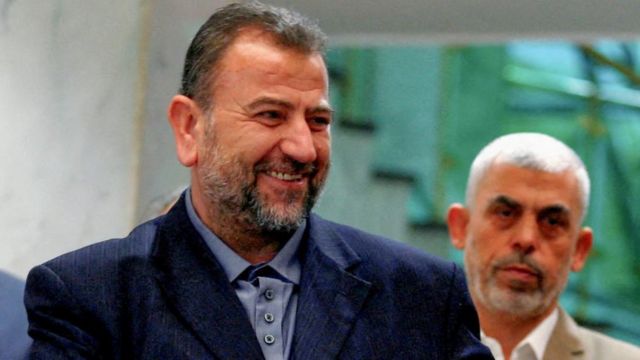
Saleh al-Arouri (left) masterminded attacks in the occupied West Bank

Lebanese emergency responders at the site of the air strike
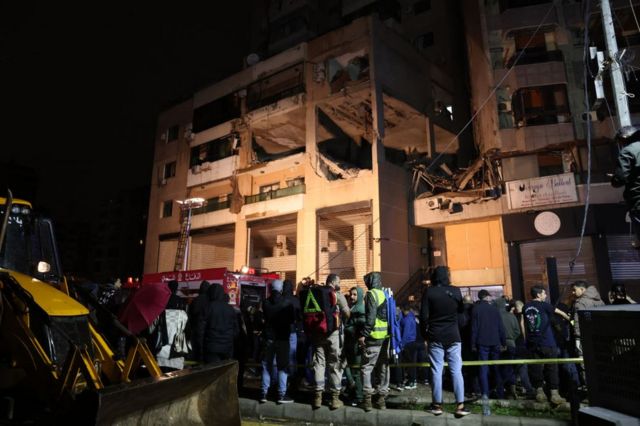
Arouri, 57, is the most senior Hamas figure to be killed since Israel went to war with the group after its 7 October attack.
Israel has insisted the assassination of a Hamas leader in Beirut was not an attack on Lebanon, as its enemies warned of "punishment" for his death.
An Israeli spokesman said Saleh al-Arouri had died in a "surgical strike against the Hamas leadership".
Hamas condemned the death, while its ally Hezbollah said it was an assault on Lebanese sovereignty.
Lebanon's prime minister, meanwhile, accused Israel of trying "to drag Lebanon into... confrontation".
Lebanese media report that Arouri, a deputy political leader of Hamas, was killed in a drone strike in southern Beirut along with six others - two Hamas military commanders and four other members.
He was a key figure in the Qassam Brigades, Hamas's armed wing, and a close ally of Ismail Haniyeh, the Hamas leader. He had been in Lebanon acting as a connection between his group and Hezbollah.
Israeli spokesman Mark Regev stopped short of confirming Israel had carried out the assassination, a standard position for Israeli officials, but he told MSNBC: "Whoever did it, it must be clear that this was not an attack on the Lebanese state.
"It was not an attack even on Hezbollah, the terrorist organisation.
"Whoever did this did a surgical strike against the Hamas leadership. Whoever did this has a gripe with Hamas. That is very clear."
Arouri, 57, is the most senior Hamas figure to be killed since Israel went to war with the group after its 7 October attack.
On that day, waves of Hamas gunmen invaded Israel and attacked communities around the border, killing about 1,200 people, mostly civilians, and taking around 240 to Gaza as hostages.
Israel launched a military offensive in response, with the declared aim of destroying Hamas.
Since then, more than 22,000 Palestinians - mostly women and children - have been killed in Israeli strikes on Gaza, according to Gaza's Hamas-run health ministry.
Hezbollah has fired scores of rockets into Israel and fought several skirmishes with Israeli forces during the Gaza war.
Lebanon's state news agency said Arouri had been killed by an Israeli drone attack on a Hamas office in the southern Beirut suburb of Dahiyeh.
A witness from Reuters news agency saw firefighters and paramedics gathered around a high-rise building where there was a large hole in what appeared to be the third floor.
Video footage on social media showed a car in flames and extensive damage to buildings in what is a busy residential area.
Dahiyeh is known as a stronghold of Hezbollah.
Mr Haniyeh, the head of Hamas's political wing, called the attack a "cowardly... terrorist act, a violation of Lebanon's sovereignty, and an expansion of its circle of aggression".
Hezbollah said that it considered Arouri's death "to be a serious assault on Lebanon, its people, its security, sovereignty, and resistance, and the highly symbolic and significant political and security messages it contains".
It said the attack was "a dangerous development in the course of the war... and we in Hezbollah affirm that this crime will never pass without response and punishment.
"Its hand is on the trigger, and its resistors are in the highest levels of readiness and preparedness," it added.
Iran, a major supporter of both groups, said Arouri's killing would "undoubtedly ignite another surge in the veins of resistance".
An Israeli security cabinet meeting scheduled for Tuesday evening to discuss the post-war plan for Gaza was cancelled.
The Lebanese Foreign Minister, Abdallah Bou Habib, told BBC Radio 4 his government was talking to Hezbollah to "impress on them that they should not respond themselves" but that: "We don't tell them, we dialogue with them in this regard."
Over the next 24 hours it will become clear "whether they respond or not", he said, adding: "We are very concerned, [the] Lebanese don't want to be dragged, even Hezbollah does not want to be dragged into a regional war."
And he called on the West to "pressure Israel to stop also all its violence and all of its actions, not only on Lebanon, not only on Beirut, but also in Gaza".
Israeli Prime Minister Benjamin Netanyahu has previously vowed to eliminate Hamas's leaders, wherever they are.
Arouri was also considered the de facto leader of Hamas's military wing in the West Bank, overseeing attacks there, according to Israeli media reports.
He is believed to have been involved in the kidnapping and killing of three Israeli teenagers in the occupied West Bank in 2014, reports say, and had served time in Israeli jails for other attacks.
The Times of Israel says he was also one of the Hamas officials most closely connected to Iran and Hezbollah.
Who was Hamas leader Saleh al-Arouri killed in Beirut?
Who was Hamas leader Saleh al-Arouri killed in Beirut? - BBC News
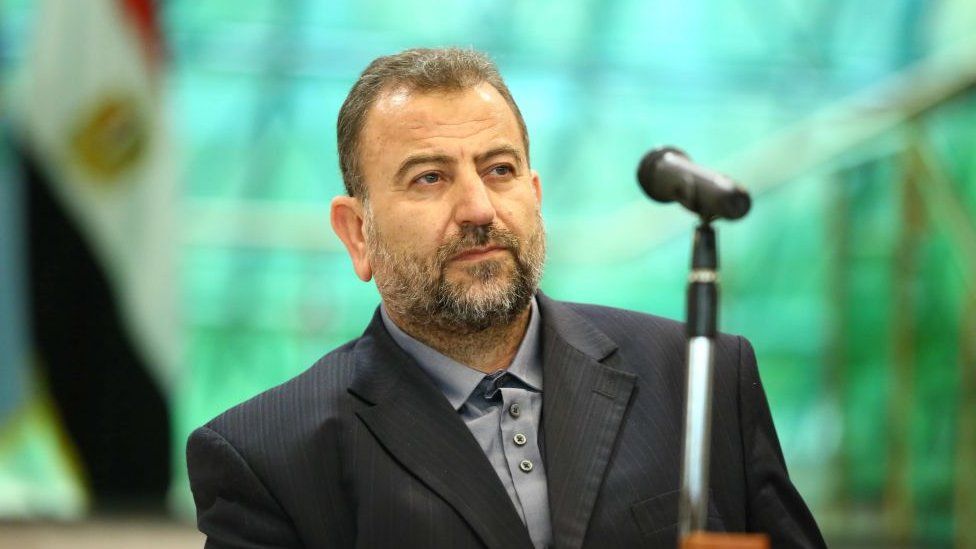
Saleh al-Arouri was one of the most senior figures in the Hamas hierarchy - a leading man on both the political and military fronts.
The 57-year-old was the deputy head of Hamas's political bureau, and helped establish the group's military wing, the Izz al-Din al-Qassam Brigades.
He had remained deeply involved with the group's military affairs.
He was killed in an explosion in Beirut's southern suburb of Dahiyeh, an attack widely blamed on Israel.
Saleh al-Arouri joined Hamas in 1987, and helped establish the group's military presence in the occupied West Bank.
He was one of the closest connected Hamas officials to both Iran and Iran-backed Hezbollah in Lebanon.
He had served time in Israeli prisons. After his release he was a negotiator in a deal that saw more than 1,000 Palestinian prisoners being released in return for the freeing of Israeli soldier Gilad Shalit in 2011.
On 27 October this year the Israeli army had demolished his West Bank home in the town of Arura, near Ramallah on 27 October. Arouri was living in Lebanon at the time of his death.
Lebanese media reported that he was killed in an Israeli drone attack on Hamas's office in the southern Beirut suburb of Dahiyeh, alongside six others who were reported to have also been members of Hamas.
This is not just about who was killed but where he was killed. A senior Hamas official killed in a Hezbollah stronghold in Lebanon is bound to make things even more precarious at a very volatile junction in the fighting.
Lebanon's caretaker Prime Minister Najib Mikati described the killing as a new Israeli war crime that aimed to drag Lebanon into a new phase of the conflict.
Hezbollah called the attack a "serious assault on Lebanon, its people, its security, [and] sovereignty" and warned that "this crime will never pass without response and punishment".
Izzat Al-Rishq, a member of the Hamas Political bureau called it a "cowardly assassination by the Zionist occupation".
Israel's military has not commented, telling the BBC it does not respond to reports in foreign media.
Israel is widely reported to commit targeted killings on foreign soil, but rarely comments on cross-border strikes. Mark Regev, adviser to Israeli Prime Minister Benjamin Netanyahu, did not say that Israel was responsible but called the attack a "surgical strike" against Hamas's leadership.
The country and the wider region now faces an anxious wait to see how Hezbollah reacts, and whether Israel's war in Gaza spills over into Lebanon.
Hamas: Who are the group's most prominent leaders?
Hamas: Who are the group's most prominent leaders? - BBC News
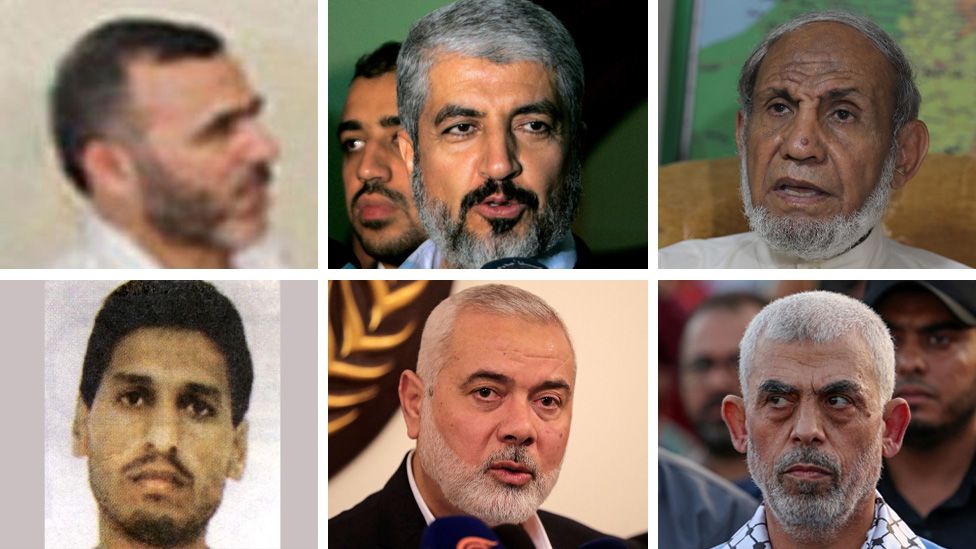
Since Hamas blindsided Israel with its most ambitious attack ever launched from Gaza, questions have been raised over who masterminded the deadly invasion.
Many of the highest-ranking men belonging to the militant Palestinian group controlling Gaza keep a low public profile, while others have spent much of their lives evading assassination attempts by Israel.
These are Hamas's most prominent leaders.
Ismail Haniyeh
Ismail Haniyeh is widely considered Hamas's overall leader.
A prominent member of the movement in the late 1980s, Israel imprisoned Haniyeh for three years in 1989 as it cracked down on the first Palestinian uprising.
He was then exiled in 1992 to a no-man's-land between Israel and Lebanon, along with a number of Hamas leaders.
After a year in exile, he returned to Gaza. In 1997 he was appointed head of the office of Hamas's spiritual leader, strengthening his position.
Haniyeh was appointed Palestinian prime minister in 2006 by President Mahmoud Abbas after Hamas won the most seats in national elections, but was dismissed a year later after the group ousted Mr Abbas' Fatah party from the Gaza Strip in a week of deadly violence.
Haniyeh rejected his sacking as "unconstitutional", stressing that his government "would not abandon its national responsibilities towards the Palestinian people", and continued to rule in Gaza.
He was elected head of Hamas's political bureau in 2017.
In 2018, the US Department of State designated Haniyeh a terrorist. He has lived in Qatar for the past several years.
Yahya Sinwar
The leader of the Hamas movement within the Gaza Strip, Yahya Sinwar, was born in 1962.
He is the founder of the Hamas security service known as Majd, which manages internal security matters, investigates suspected Israeli agents and tracks down Israeli intelligence and security services officers.
Sinwar has been arrested three times. After his third arrest in 1988 he was sentenced to four life terms in prison.
However, he was among 1,027 Palestinian and Israeli Arab prisoners released by Israel in exchange for an Israeli soldier held captive for over five years by Hamas.
Sinwar returned to his position as a prominent leader in Hamas and was appointed head of the group's political bureau in the Gaza Strip in 2017.
In 2015, the US included Sinwar on its blacklist of "international terrorists".
Mohammed Deif
Mohammed Deif leads the Izz al-Din al-Qassam Brigades, the military arm of the Hamas movement.
He is a shadowy figure known to Palestinians as The Mastermind, and to Israelis as The Cat with Nine Lives.
Israeli authorities imprisoned him in 1989, after which he formed the al-Qassam Brigades with the aim of capturing Israeli soldiers.
After his release, he helped engineer the construction of tunnels that have allowed Hamas fighters to get inside Israel from Gaza,
Deif is one of Israel's most-wanted men, accused of planning and supervising bus bombings which killed tens of Israelis in 1996, and of involvement in the capture and killing of three Israeli soldiers in the mid-1990s.
Israel imprisoned him in 2000, but he escaped at the beginning of the second Palestinian uprising, or intifada.
Since then, he has left behind little trace. There are three known pictures of him: one is dated, he is masked in the second, and the third is of his shadow.
The most serious assassination attempts on his life were in 2002: Deif survived but lost one of his eyes. Israel says he also lost a foot and a hand, and that he has difficulty speaking.
Israeli security forces again failed to assassinate Deif during a 2014 assault on the Gaza Strip, but killed his wife and two of his children.
Marwan Issa
Marwan Issa, or the Shadow Man and Mohammed Deif's right-hand man, is the deputy commander-in-chief of the Izz al-Din al-Qassam Brigades.
Israeli forces detained him during the first intifada for five years due to his activity with Hamas.
The Palestinian Authority arrested Issa in 1997, but he was freed after the second intifada in 2000.
He was on Israel's most-wanted list, and was injured when Israel attempted to assassinate him in 2006.
Israeli warplanes also destroyed his house twice during invasions of Gaza in 2014 and 2021, killing his brother.
It was not known what Issa looked like until 2011, when he appeared in a group photo taken during a reception for exchanged prisoners.
He is thought to have played a significant role in planning incursions into Israel, including the most recent.
Khaled Meshaal
Khaled Meshaal, who was born in the West Bank in 1956, is considered one of the founders of Hamas.
Under direct instructions from Israeli Prime Minister Benjamin Netanyahu, Israel's Mossad spy agency attempted to assassinate Meshaal in 1997 while he was living in Jordan,
Mossad agents entered Jordan with forged Canadian passports and Meshaal was injected with a toxic substance while walking along a street.
Jordanian authorities discovered the assassination attempt and arrested two Mossad members.
The late King Hussein of Jordan asked Israel's PM for the antidote for the substance Meshaal was injected with. Facing pressure from then US President Bill Clinton, Mr Netanyahu provided the antidote after initially rejecting the request.
Meshaal, who lives in Qatar, visited the Gaza Strip for the first time in 2012. He was received by Palestinian officials and crowds of Palestinians came out to welcome him.
Hamas elected Ismail Haniyeh to succeed Meshaal as head of its political bureau in 2017, and Meshaal became head of the group's political bureau abroad.
Mahmoud Zahar
Mahmoud Zahar was born in Gaza in 1945 to a Palestinian father and an Egyptian mother. He is considered one of Hamas' most prominent leaders, and a member of the movement's political leadership.
He went to school in Gaza and university in Cairo, then worked as a doctor in Gaza and Khan Younis until Israeli authorities dismissed him over his political position.
Mahmoud Zahar was held in Israeli prisons in 1988, months after the founding of Hamas. He was among those deported by Israel to no-man's land in 1992, where he spent a year.
With the Hamas movement winning Palestinian general elections in 2006, Zahar joined the Ministry of Foreign Affairs in Prime Minister Ismail Haniyeh's newly formed government before its eventual dismissal.
Israel attempted to assassinate Zahar in 2003, when a plane dropped a bomb on his house in Gaza City. The attack left him with minor injuries, but killed his eldest son, Khaled.
His second son, Hossam, who was a member of the al-Qassam Brigades, was killed in an Israeli air strike in Gaza in 2008.
More on Israel-Gaza war
- Follow live: Latest updates
- Explained: What's going on in Gaza and Israel, and why now?
- History behind the story: The Israel-Palestinian conflict
- Hamas attack: Family seeks answers after live-stream horror
- From Gaza: BBC reporter flees Israel bomb warning
Food and medicine run low in Gaza as aid waits at border crossing - BBC News
Food and medicine run low in Gaza as aid waits at border crossing
With updates from Rushdi Abualouf in Gaza; Lyse Doucet, Lucy Williamson in southern Israel; Jeremy Bowen, Paul Adams, Yolande Knell, Tom Bateman and Joel Gunter in Jerusalem; Anna Foster in northern Israel; and Hugo Bachega in Beirut
Summary
- Hundreds of vehicles carrying aid are waiting to be allowed into Gaza to bring in vital supplies
- US President Biden has secured an agreement with Egypt to allow up to 20 lorries to enter the territory
- Aid agencies are warning that far more will be needed - UN humanitarian chief, Martin Griffiths, says about 100 lorries a day will be required
- UK PM Rishi Sunak has arrived in Saudi Arabia for talks with Crown Prince Mohammed bin Salman - after earlier meeting his Israeli counterpart in Jerusalem
- Israeli airstrikes have continued to pound the Gaza for a thirteenth day since the attack on Israel by Hamas
- The enclave remains under siege, with Israel blocking supplies of water, electricity, food and fuel across its border
- The most serious escalation in the conflict in decades erupted on 7 October, when Hamas launched an attack on Israel, killing more than 1,400 people
- More than 3,700 people have been killed in Gaza since then, the health ministry in the territory says
Gazans can access about three litres of water a day
Water for basic needs in Gaza is running dangerously low, with no supplies being allowed in for over a week after Israel launched a "complete siege" following Hamas's 7 October attacks.
For anyone trying to get a sense of the scale of how much supplies have run dry, we've created this graphic to demonstrate it:
Drone footage shows shelters being used for those displaced
Hundreds of thousands of people have been displaced after the Israel-Gaza conflict started on 7 October.
Charities like UNRWA - the United Nations Relief and Works Agency - have been finding shelters for those who need it.
These tents are near the centre of the southern city of Khan Younis.
Risk of Israel-Hamas conflict spill over is 'real' - von der Leyen
European Commission President Ursula von der Leyen said the risk of regional spill over from the Israel and Hamas conflict is "real".
Speaking at the Hudson Institute in Washington, von der Leyen said dialogue between Israel and its neighbours must continue.
Moody's says Israel's credit rating 'under review'
Israel's credit rating is under review due to the military conflict with Hamas, according to global ratings agency Moody's.
A downgrade from Israel's A1 ratings could make it more difficult and expensive for the country to borrow money.
Moody’s says that the review has been “triggered by the unexpected and violent conflict between Israel and Hamas”.
"While a short-lived conflict could still have credit impact, the longer lasting and more severe the military conflict, the greater its impact is likely to be on policy effectiveness, public finances and the economy," Moody's said.
Moody's outlook for the nation had previously been stable
The world is losing its humanity - UNRWA chief

Jeremy Bowen
International Editor
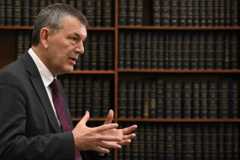
The Middle East is on the "edge of an abyss" as a result of the war between Israel and Hamas, UN agency chief Philippe Lazzarini has told the BBC.
The commissioner-general of UN relief agency UNRWA said violence could spill over across the region.
And he warned about the dire situation for civilians inside Gaza, calling again for humanitarian aid corridors into the territory.
Lazzarini said he fears "the world is now losing its humanity".
In an exclusive interview with the BBC, Lazzarini reiterated calls for humanitarian aid corridors, saying help "needs to be uninterrupted... predictable [and] meaningful" to help the people of Gaza.
Speaking in Jerusalem, the head of UNRWA condemned Hamas's attack on Israel, calling it a "horrific and barbaric massacre" that had created a "national trauma, a collective trauma in Israel".
Hamas says several killed in blast near Gaza church
Several people have been killed and injured in a strike near a church in Gaza, Hamas says.
They had been sheltering at the Greek Orthodox church when it was hit, the interior ministry said.
This image showing the damage to the church has been verified by the BBC:
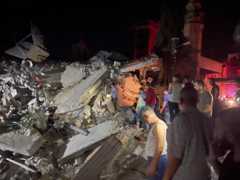
US ship shoots down missiles from Yemen, Pentagon says
A US Navy ship shot down missiles and drones from Yemen while patrolling in the Red Sea, the Pentagon said.
A Pentagon spokesperson said they could not confirm the missiles' intended target, but that they were headed "potentially toward targets in Israel".
"Our defensive response was one we would have taken for any similar threat in the region," he added.
Dr Ghassan Abu-Sittah is working in GazaImage caption: Dr Ghassan Abu-Sittah is working in Gaza
Israel's preparations for possible ground invasion in Gaza
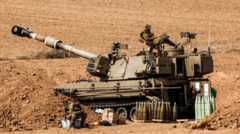
In recent days, Israel has signalled that its forces are poised to go into Gaza, with the aim of eliminating Hamas as a military force.
The scope of a potential ground assault or when it could happen is still unclear. Last week, Israel warned Palestinians living in northern Gaza to flee south, indicating an invasion was coming.
Israel's military has already massed its forces, tanks and artillery near the Gaza border. Some 300,000 reservists have been activated, alongside a standing force of more than 160,000.
Sending ground forces into Gaza is an operation fraught with risk and there are several factors that could derail it.
'My grandmother watched Hamas gunmen kill her husband, then she was kidnapped'

Nadia Ragozhina
Live reporter
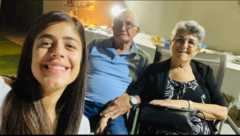
"My grandmother was taken without her glasses, she was barefoot," 25-year-old Anat Moshe Shoshani tells me over the phone.
She sounds distressed as she recounts how her friend alerted her to the existence of a video on social media, showing her 72-year-old grandmother, Adina Moshe, sandwiched on a motorcycle between two Hamas gunmen in Gaza.
On 7 October, Shoshani's grandfather, David, was killed by Hamas gunmen in Kibbutz Nir Oz, about two miles from the Gaza border. The couple had been hiding in the shelter at their home, the house later set on fire by Hamas.
She learnt of her grandmother’s fate from social media.
"We are very worried," she tells me.
"We don't know if she can survive these kind of conditions. I can't understand what they are planning to do with the elderly and the children they kidnapped."
"We can't sleep, we can't eat."
She tells me that her grandmother takes medicine every day and had heart surgery three months ago.
"Every day becomes longer when she’s not here. She watched the terrorist murder her husband. She is very upset.
"We want her back as soon as possible."
US issues worldwide travel alert for American citizens
Matt Murphy
Live reporter, in Washington DC
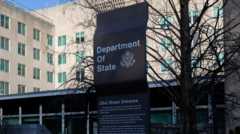
As we reported earlier, the US state department has issued a rare worldwide caution to American citizens abroad, warning them of an increased risk of violent attacks.
US citizens were urged "to exercise increased caution" while travelling due to the potential for "terrorist attacks, demonstrations or violent actions against US citizens and interests". It comes amid increasing anger in the Middle East over US support for Israel's attacks on the Gaza strip.
Worldwide cautions are rare, and the state department last issued this kind of notice in August 2022 following the assassination of al-Qaeda leader Ayman al-Zawahiri in Kabul, Afghanistan.
Before that the previous notice was issued in 2017 - after President Donald Trump recognised Jerusalem as the capital of Israel - and in 2003 immediately following the invasion of Iraq. Thursday's notice advised all US citizens to "stay alert in locations frequented by tourists".
It's unclear what prompted the warning and whether the US has received a specific threat.









